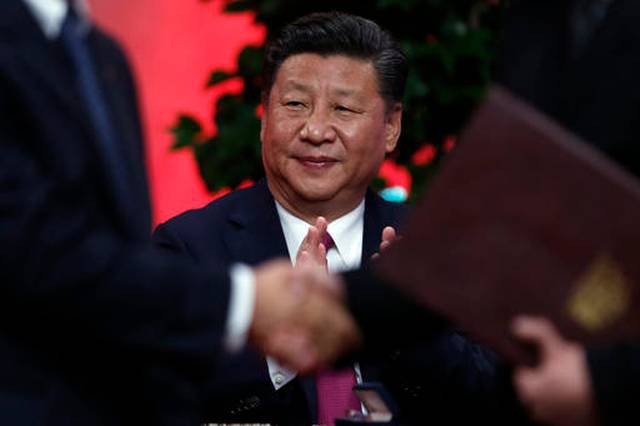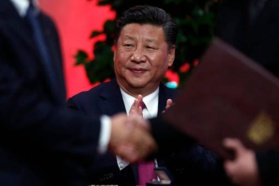By Zhao Minghao Source: People's Daily and Global Times
Chinese President Xi Jinping will attend the World Economic Forum (WEF) in Davos, Switzerland on January 17, which shows China's support for globalization and multilateralism.
As deglobalization seems to be gaining more support in the US and Europe, China hopes to raise a different voice. For Beijing, the question is not whether we need globalization, but how to make globalization more inclusive.
The WEF was founded in 1971, and Davos has become a symbol for globalization. As early as 1979 when China just started its reform and opening-up policies, it dispatched representatives to the forum, which marked China's endeavor to integrate into the international system.
Thirty-eight years later, as China becomes the second largest economy in the world, the country's top leader's first attendance at the forum has a significant symbolic meaning.
There is no denying that globalization is suffering a setback.
International trade and investment are weakening. According to statistics of the World Bank, the proportion of global trade value in GDP dropped from the approximately 52 percent in 2008 to about 45 percent in 2015. The demands of developed economies for imported products have reduced and emerging markets are caught in the economic plights. Globalization now lacks powerful momentum.
In addition, the refugee crisis in Europe is becoming even more severe. Free movement of people, which was once a goal of globalization, now comes under serious suspicion. The political forces which supported exclusivism and racism have gained momentum in France, Germany and Austria. US President-elect Donald Trump believes in "America first" rather than "globalism." He has successfully stopped the Ford Motor Company's plan to invest $1.6 billion to build factories in Mexico.
Moreover, global governance institutions are unable to adapt to the changing reality. The United Nations has been widely criticized, and the importance of the World Trade Organization is being challenged. Trump's passive attitude toward climate change makes people worry whether the Paris Agreement would be upheld if the US refuses to play its part.
Obviously, the world economy will never be saved by protectionism. International trade, cross-border investment and increased mobility of people are the preconditions for economic growth. Globalization has provided momentum for the progress of human society in the past decades, including a reduction of 660 million in China's poverty-stricken population. Globalization has promoted the establishment of market-oriented economy and technology transfer in many countries, and greatly heightened the connectedness of the world.
Of course, we cannot deny the double-edged effect of globalization. Believing that their jobs have been stolen, angry blue-collar American workers accuse immigrants for taking away the social benefits that they could have been able to enjoy.
The theme of this year's WEF is "Responsive and responsible leadership." It has attracted worldwide attention whether China will exert its leadership over global affairs.
For China, trade protectionism must be firmly opposed, and it is crucial to maintain the openness of the world economy. Global connectivity in infrastructure should be promoted, which is also the primary goal of the Belt and Road Initiative. Moreover, both developing and developed countries need to push forward structural reforms and create jobs through innovative industries.
If globalization in the past few decades is believed to be focusing on "growth," globalization 2.0 should deal with the politics of "distribution" and reduce economic and social inequality. International institutions such as the IMF also need to be further reformed, and new international organizations should be established to boost global investment.
Apparently, as China goes global, its participation in and support for globalization is also on the rise. According to a report released by the Berlin-based Mercator Institute for China Studies and the New York-based Rhodium Group, China's overseas investment increased 30 percent on average annually from 2005 to 2015. According to a People's Daily Online article, China's outbound direct investment in 2016 could be more than $170 billion.
Furthermore, China will host an international cooperation summit on the Belt and Road Initiative in May, and a summit for leaders from BRICS countries in September in Xiamen, East China's Fujian Province.
The remarks that President Xi will make at Davos are carefully choreographed. They will predict major upcoming changes in China's global diplomacy.
(The author is a research fellow at the Charhar Institute and an adjunct fellow at the Chongyang Institute for Financial Studies at Renmin University of China.)
As deglobalization seems to be gaining more support in the US and Europe, China hopes to raise a different voice. For Beijing, the question is not whether we need globalization, but how to make globalization more inclusive.
The WEF was founded in 1971, and Davos has become a symbol for globalization. As early as 1979 when China just started its reform and opening-up policies, it dispatched representatives to the forum, which marked China's endeavor to integrate into the international system.
Thirty-eight years later, as China becomes the second largest economy in the world, the country's top leader's first attendance at the forum has a significant symbolic meaning.
There is no denying that globalization is suffering a setback.
International trade and investment are weakening. According to statistics of the World Bank, the proportion of global trade value in GDP dropped from the approximately 52 percent in 2008 to about 45 percent in 2015. The demands of developed economies for imported products have reduced and emerging markets are caught in the economic plights. Globalization now lacks powerful momentum.
In addition, the refugee crisis in Europe is becoming even more severe. Free movement of people, which was once a goal of globalization, now comes under serious suspicion. The political forces which supported exclusivism and racism have gained momentum in France, Germany and Austria. US President-elect Donald Trump believes in "America first" rather than "globalism." He has successfully stopped the Ford Motor Company's plan to invest $1.6 billion to build factories in Mexico.
Moreover, global governance institutions are unable to adapt to the changing reality. The United Nations has been widely criticized, and the importance of the World Trade Organization is being challenged. Trump's passive attitude toward climate change makes people worry whether the Paris Agreement would be upheld if the US refuses to play its part.
Obviously, the world economy will never be saved by protectionism. International trade, cross-border investment and increased mobility of people are the preconditions for economic growth. Globalization has provided momentum for the progress of human society in the past decades, including a reduction of 660 million in China's poverty-stricken population. Globalization has promoted the establishment of market-oriented economy and technology transfer in many countries, and greatly heightened the connectedness of the world.
Of course, we cannot deny the double-edged effect of globalization. Believing that their jobs have been stolen, angry blue-collar American workers accuse immigrants for taking away the social benefits that they could have been able to enjoy.
The theme of this year's WEF is "Responsive and responsible leadership." It has attracted worldwide attention whether China will exert its leadership over global affairs.
For China, trade protectionism must be firmly opposed, and it is crucial to maintain the openness of the world economy. Global connectivity in infrastructure should be promoted, which is also the primary goal of the Belt and Road Initiative. Moreover, both developing and developed countries need to push forward structural reforms and create jobs through innovative industries.
If globalization in the past few decades is believed to be focusing on "growth," globalization 2.0 should deal with the politics of "distribution" and reduce economic and social inequality. International institutions such as the IMF also need to be further reformed, and new international organizations should be established to boost global investment.
Apparently, as China goes global, its participation in and support for globalization is also on the rise. According to a report released by the Berlin-based Mercator Institute for China Studies and the New York-based Rhodium Group, China's overseas investment increased 30 percent on average annually from 2005 to 2015. According to a People's Daily Online article, China's outbound direct investment in 2016 could be more than $170 billion.
Furthermore, China will host an international cooperation summit on the Belt and Road Initiative in May, and a summit for leaders from BRICS countries in September in Xiamen, East China's Fujian Province.
The remarks that President Xi will make at Davos are carefully choreographed. They will predict major upcoming changes in China's global diplomacy.
(The author is a research fellow at the Charhar Institute and an adjunct fellow at the Chongyang Institute for Financial Studies at Renmin University of China.)
 Menu
Menu
 China to uphold openness of global economy at Davos
China to uphold openness of global economy at Davos

















